Last week, I had lunch with a colleague. As we parted, he said, “I enjoyed this, but next I have to ask you questions. It felt like you were interviewing me.”
This morning, I arrived to class 15 minutes early, and I had a ten minute conversation with a student about her two brothers, her dad’s motorcycle fascination, her summer job as a lifeguard, and her athletic injury. In the other five minutes, I discovered a a student had been playing Carole King’s “It’s Too Late” on repeat.
At lunch, I asked questions of two other friends between bites of food, discovering that one had taught Spanish in public high schools for 16 years and another had been a youth minister at a church plant in New Zealand.
During office hours, I recorded an interview with a senior English major about her honors project.
This, apparently, is one of my daily practices.
After lunch today, my friend asked me why I ask so many questions. I replied that so often, people never ask someone else how they’re doing because they just want to talk about themselves. I decided I would be the outlier and try to address that imbalance. I like hearing about how others are doing.
During the interview today, I was particularly engaged. I wanted to know what my student would say, and while I had questions to get to, I was never preoccupied with the next question while the student was providing a current answer. It was a real conversation. I left having learned something and, hopefully, I gave the student a chance to articulate some things that would otherwise have gone unsaid.
The only problem is that question asking can be a way of hiding. I can ask questions for selfish reasons: because I don’t feel like talking or feel like I don’t have anything smart to say or because I want to be seen as a good question asker.
The way I know my question asking is doing some good is if I’m not thinking about the person I’m having a conversation with more than myself. I pray have more opportunities like today to exercise this habit: informal conversations with students, longer conversations with colleagues from different disciplines, and celebratory interviews with budding scholars. I also pray that I help my interlocutors feel heard, and that when it’s time for me to open my mouth, I add something to the conversation.


